The George Washington Presidential Library at Mount Vernon welcomes our twelfth class of research fellows for the 2025-26 academic year. Their research helps us better understand the history of colonial America, the Revolutionary era, and the early American republic.
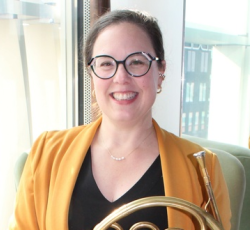
Katy Ambrose, D.M.A.
Reviving the Sound of William Lee’s Mount Vernon
Katy Ambrose is Assistant Professor of Horn at the University of Iowa. From 2015-21 she was on faculty at the University of Virginia, and Principal Horn of the Charlottesville Symphony. Katy’s extensive orchestral experience includes having held positions in many regional orchestras throughout the United States and substituting with major ensembles such as the Boston Pops, Philadelphia Orchestra, Kansas City Symphony, Daejeon Philharmonic, Hawai’i Symphony, Richmond Symphony, and the Virginia Symphony. A dedicated chamber musician, she is a member of the Mirari Brass Quintet and Lanta Horn Duo, and spends her summers in Northern Michigan teaching at the Bay View Music Festival Brass Quintet Seminar. Dr. Ambrose received her Doctor of Musical Arts from Temple University, Artist Diploma from Yale University, Master’s from Cincinnati College-Conservatory of Music, and Bachelor’s from the University of Michigan.
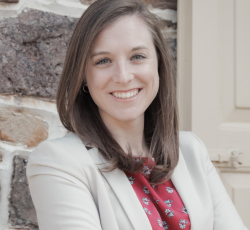
Jacqueline Beatty, Ph.D.
Engendering Orientalism in the Empire of Liberty
Jacqueline Beatty is Associate Professor of History at York College of Pennsylvania, where she teaches courses in early American history, women’s and gender history, and public history. She has published several articles and chapters, and is the author of In Dependence: Women and the Patriarchal State in Revolutionary America (NYU, 2023). At Mount Vernon, she will conduct research on the intersections of gender, Orientalism, and early American national identity.
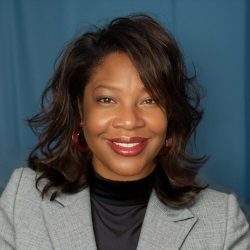
Felicia A. Bell, Ph. D.
The Negroes Alone Work: Enslaved and Free Black Craftsmen and the Construction of the United States Capitol
Felicia Bell’s career has included leadership roles such as Director of Education and Programs at the United States Capitol Historical Society, Assistant Professor of History and the inaugural Director of Honors at Savannah State University, Director of Troy University’s Rosa Parks Museum, Director of Public Engagement for the Smithsonian’s Our Shared Future: Reckoning with Our Racial Past, and Senior Advisor to the Director at the Smithsonian’s National Museum of American History. In 2007, she provided expert witness testimony to Congress based on her doctoral dissertation research about the enslaved and free Black craftsmen used to construct the United States Capitol. She is a contributing author to Landscapes in the Making (Harvard University Press, 2025), where she delves further into her research topic. Dr. Bell received recognition by the House of Representatives of the State of Alabama for her distinguished work at the Rosa Parks Museum. She earned a Bachelor of Arts in history from Savannah State University, a Master of Arts in historic preservation from Savannah College of Art and Design, and a Doctor of Philosophy in U.S. history from Howard University.
Recipient of the Black Women United for Action Fellowship

Richard Bell, Ph.D.
America’s Birth Certificate: The Declaration of Independence
Richard Bell is Professor of History at the University of Maryland and author of the book Stolen: Five Free Boys Kidnapped into Slavery and their Astonishing Odyssey Home which was a finalist for the George Washington Prize and the Harriet Tubman Prize. He has held major research fellowships at Yale, Cambridge, and the Library of Congress and is the recipient of the National Endowment of the Humanities Public Scholar award and the Andrew Carnegie Fellowship. His new book, The American Revolution and the Fate of the World, will be published by Penguin in November 2025.
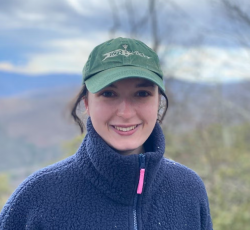
Rachel Ciampoli
Aesthetics of Elision: Eastman Johnson, Race, and Nation
Rachel Ciampoli is a doctoral candidate in the department of Art and Art History at the University of North Carolina Chapel Hill specializing in nineteenth-century art of the United States. Her current research proposes a reexamination of the work of Eastman Johnson, a prolific nineteenth-century artist, through the slipperiness of racial classification and discourses of memory and tradition. Rachel received a BA in Art History from the College of William and Mary in 2019. Her undergraduate honors thesis examined nineteenth-century urban ecology, public parks development, and antebellum racial politics through the previously unexplored painting “Servants at a Pump” (1840) by Italian-American artist Nicolino Calyo. Before beginning her Ph.D. program, Rachel spent three years developing a visual arts integration initiative within the Education department at the National Museum of African American History and Culture in Washington, D.C. During her Ph.D. program, Rachel has served as the 2022-2023 Humanities Futures Graduate Fellow at the National Humanities Center, the 2023 Alfred Appel, Jr. Curatorial Fellow at the Delaware Art Museum, and as a 2025 Critical Ethnic Studies Graduate Fellow at the Center for the Study of the American South.
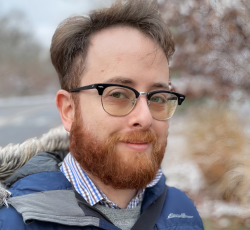
Zachary Conn, Ph.D.
Federal Indian Agents of the Early United States
Zachary Conn is a historian of eighteenth- and nineteenth-century North America and a postdoctoral fellow at the Center for Presidential History at Southern Methodist University. In Fall 2025, he will take up a new position as a postdoctoral fellow in the Idaho Society of Fellows at the University of Idaho. He studied Early American History at the University of Chicago and at Yale University, where he earned a PhD in December 2022. His first book, Federal Indian Agents of the United States, is under advance contract with the Global America series at Columbia University Press. The book will be the first modern scholarly study of the early U.S. government’s little-remembered ambassadors to Native American nations. Conn’s scholarly writing has appeared or is forthcoming in History and Theory, Intelligence and National Security, and Diplomatic History. He is also an active public historian who is serving as the host and writer for Season 5 of the Center for Presidential History’s podcast, The Past, the Promise, the Presidency. He has taught History at Yale, the University of New Haven, Albertus Magnus College, and a private high school on Long Island.
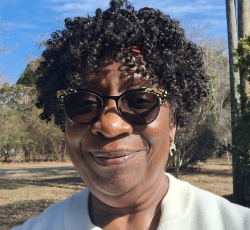
Ywone Edwards-Ingram, Ph.D.
Coachmen in Slavery and Freedom: The Convergence of Work and Display
Ywone (Wyonie) Edwards-Ingram is an Assistant Professor at the Virginia Commonwealth University where she teaches undergraduate courses in writing, communication, and literacy. She has graduate degrees and a history of teaching in Anthropology and American Studies at William and Mary. Her publications showcase her experience in archaeology and public history at Colonial Williamsburg and include, The Art and Soul of African American Interpretation (Colonial Williamsburg, 2016) and a co-edited volume, Historical Archaeology in the Twenty-First Century (University Press of Florida, 2021). At Mount Vernon, she will focus on George Washington’s coachmen as part of her broader study of the enslaved and free individuals who worked with coaches, carriages, and horses, but especially those of the households of historical presidents and other elites. This research follows from her journal article, “Before 1979: African American Coachmen, Visibility, and Representation at Colonial Williamsburg” (The Public Historian, 2014). She is a past recipient of research scholarships from New-York Historical Society, Monticello, and the Omohundro Institute and Jamestown Rediscovery Foundation.
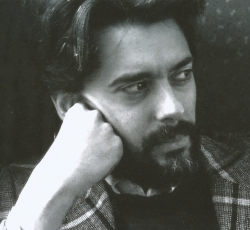
Luca Irwin Fragale, Ph.D. Habil.
Freemasonry and its places along the George Washington milieu
Luca Irwin Fragale is a Research Fellow at Freie Universität Berlin and a Postdoc Researcher at Heidelberg for the Gerda Henkel Stiftung. He earned the Habilitation as an Associate Professor in History of Political Thought and Institutions and, previously, a Ph.D. in History of Political Doctrines at La Sapienza University in Rome. He is a former Visiting Research Fellow at Aarhus Universitet-Institut for Kultur og Samfund. He graduated at the University of Bologna with a thesis in History of Law and he earned a postgraduate degree of Archival Science, Paleaography and Diplomatics. He is the author of several monographs and scientific papers mainly about the history of Freemasonry, Fascism, the Grand Tour and history of Southern Italy, but also encyclopedic entries for the Italian historical pages of the Senate of the Republic.
Recipient of the George Washington Masonic National Memorial Fellowship
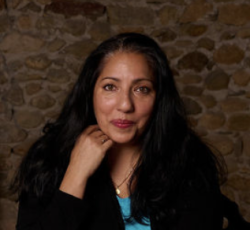
Ramin Ganeshram
Summer Spies, Soldiers, and Servants: African Americans in Washington's Revolutionary New York
Ramin Ganeshram is a culinary historian and executive director of Westport Museum for History & Culture in Westport, CT. Ganeshram studies the foodways of African-descendant and mixed race communities in colonial and early Federal America as well as the English-speaking Caribbean. Ganeshram’s forthcoming books include Coal Pots & King Cane: Caribbean Foodways and the Making of America (UNC Press 2026) and Stirring Liberty: How George Washington’s Enslaved Chef Transformed American Cuisine and Secretly Cooked His Way to Freedom (Simon & Schuster/37Ink 2026). She is considered the foremost expert on Hercules Posey, the chef enslaved by George and Martha Washington. As a Fellow, Ganeshram is working on a book proposal about how enslaved and free communities of color covertly and overtly influenced and affected Washington’s actions as commander of the Continental Army during the summer of 1776 while occupying Manhattan Island.
Photo credit: Jerri Graham Photography

Ethan Gonzales
The Visible State: U.S. Diplomatic Agents and Information Strategies in Europe and the Federal Territories, 1789-1800
Ethan Gonzales is a Ph.D. candidate in History at the University of Virginia. He is interested in the ways in which the federal government mobilized information to advance national interests in the North American interior and in Europe during the 1790s. His research will be published in a forthcoming article in the Journal of the Early Republic titled, “Thomas Jefferson’s Information War and the Early American State in Europe, 1784-1793.” Originally from southeast Michigan, Gonzales served as a sergeant in the active-duty Army before pursuing a career in academia.
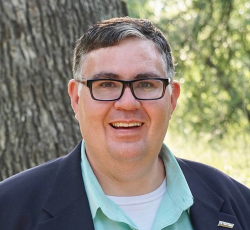
Timothy C. Hemmis, Ph.D.
A Man Caught In Between: Mapping, Espionage, and the Life of the Geographer of the United States, Thomas Hutchins, 1730-1790.
Timothy C. Hemmis is an Associate Professor of History at Texas A&M University- Central Texas in Killeen. His latest book project, A Man Caught In Between: Mapping, Espionage, and the Life of the Geographer of the United States, Thomas Hutchins, 1730-1790, examines the overlooked role of Thomas Hutchins in the creation of the United States, using his life as a case study of how American identity evolved throughout the Revolutionary Era. His maps and writings inspired the concept of American Manifest Destiny and westward expansion long before it became a buzzword in the mid-nineteenth century. During the War for Independence, geographers like Hutchins provided an indispensable service to the military and to the government. Moreover, Hutchins was one of the highest-ranking British officers to defect to the American side. After the war, he served as a cartographer for the young republic, organizing he survey system for the Old Northwest Territory (present-day Ohio) and helping resolve boundary disputes between states. Additionally, Hutchins also proposed an expedition to the Pacific Ocean two decades before the famed Lewis and Clark Expedition. Ultimately, Hutchins’s many activities helped boost America’s appetite for the west and territorial expansion that became part of the young republic’s identity.
Recipient of the Society of Colonial Wars Fellowship
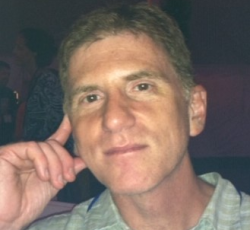
Steven Krug
“An Entire Revolution in Fortune”: Wealth, Risk, and Crisis in the Post-Revolutionary Virginia Plantation Economy
Steven Krug is a Ph.D. candidate in the University of Georgia history department with research interests in eighteenth-century Anglo-American relations and southern political economy in the Early Republic. His dissertation examines how Virginia planters construed the altered economic landscape of the new, post-Revolutionary world and how risk and uncertainty influenced their business mindset. He has presented his research at conferences hosted by Texas A&M University and Florida State University and his work has been published in the Atlanta Journal Constitution. He obtained his undergraduate degree in business administration at the University of Virginia and worked for many years as a financial consultant. He earned his B.A. in history at Arizona State University in 2016 and his Master’s degree from the University of Georgia in 2020.
Recipient of the James C. Rees Fellowship on the Leadership of George Washington

Joseph D. Litts
Natural Disaster in the Atlantic World: Aesthetics, Delight, and Risk During the Eighteenth Century
Joseph D. Litts is a Ph.D. Candidate in art history at Princeton University. His dissertation, entitled Natural Disaster in the Atlantic World: Aesthetics, Delight, and Risk During the Eighteenth Century, examines representations of catastrophe: how does material culture instruct observers how to negotiate disaster? Ultimately, Sublime aesthetics attempted to transform the risks of eighteenth-century life into something beneficial across pleasure gardens, novels, and paintings. At Mount Vernon, Joseph will examine the library’s manuscript collections to better understand how both Washington and everyone on the estate managed potential risks and responded to actual disasters, such as storms.
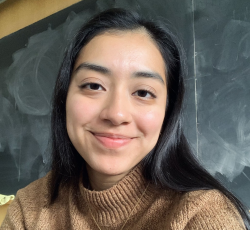
Arya Martinez
The Turbulent Confederation: The Bank of North America and the Emergence of a New National Economy
Arya Martinez is a History Ph.D. candidate at the University of New Hampshire. Her dissertation explores the debates and controversies over the Bank of North America from the end of the American Revolution until George Washington’s first administration. The early 1780s were plagued by economic instability, political fragmentation, and social unrest, prompting the introduction of the Bank as a remedy to these problems. Though the Bank of North America was based in Philadelphia, reactions to it varied across states. Virginia, as a key political and cultural center post-Revolution, offers a unique perspective on banking and fiscal practices. At Mount Vernon, Martinez will research families like the Washingtons, who were acutely aware of the Bank's advantages and disadvantages. Their experiences will help illuminate the Virginian perspective on the broader impact of the Bank's operations on American economic thought.
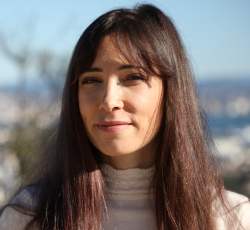
Emilie Mitran, Ph.D.
Engaging with the French Revolution in the United States: A Reflection on Politics, Diplomacy, and Regional Cultures (1780s–1989)
Emilie Mitran is a historian specializing in American history and transatlantic intellectual exchanges. She is a faculty member at the University of Toulon in France and holds a Ph.D. in American History from Aix-Marseille University. Her research focuses on the reception of the French Revolution in the United States, exploring diplomatic, cultural, and ideological relations between the two nations. Her dissertation, Gouverneur Morris, traducteur de la Révolution française, examined the intersections of diplomacy and cultural translation, highlighting the complexities of republicanism as a universal language of liberty and self-governance. This work led to the publication of her first book, Les Perséides (Rennes, 2022). Her second book, Une Relation révolutionnaire: des Américains à Paris (1776-1793), will be published by Nouveau Monde Éditions in the fall of 2025.
Recipient of the James C. Rees Fellowship on the Leadership of George Washington

Julian Davis Mortenson, J.D.
The Founders’ President
Julian Davis Mortenson is the James G. Phillip Professor of Law at the University of Michigan. A legal historian who specializes in the legal and political history of early America, he is currently working on a book project that develops a comprehensive account of presidential power at the American founding. The project aims to establish a new paradigm for the lived history of executive power by showing that the eighteenth-century presidency was understood, not as the amorphous locus of unspecified sovereign rights, but as the rule-bounded instrument of a statutory agenda over which the president himself had enormous influence.
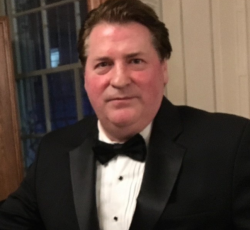
Patrick K. O’Donnell
Washington’s Elite: The Unknown Story of the Revolution’s Special Troops
Patrick K. O’Donnell is a bestselling, critically acclaimed military historian, and one of the world’s leading authorities on special operations forces and elite units. He is the author of fourteen books, including several recent bestselling, award-winning works, including, The Indispensables, Washington’s Immortals, and The Unvanquished. He served as a combat historian who fought house-to-house with a Marine Corps rifle platoon during the Battle of Fallujah and is a professional speaker on America’s conflicts, espionage, special operations, and counterinsurgency. Over the past thirty-three years, he has conducted thousands of oral histories with WWII veterans and members of elite and special operations units. He writes monthly for several national publications, and the big screen, he has provided historical consulting for DreamWorks’ award-winning miniseries Band of Brothers and for scores of documentaries produced by the BBC, Fox News, and the History Channel.

Amanda Roper
Saving America’s Past: Women in Preservation
Amanda Roper is a public historian whose work focuses on preserving historic places and sharing traditionally underrepresented stories from America's past. Amanda holds a degree in history from the College of Charleston and has worked for the National Park Service and the Smithsonian, but is most passionate about historic house museums. She served as Director of the Lee-Fendall House Museum and Sr. Manager of Public Programs & Interpretation at Woodlawn & Frank Lloyd Wright’s Pope-Leighey House. In 2018, She was recognized by the National Trust for Historic Preservation on their list of 40 Under 40: People Saving Places for her significant impact on historic preservation and her contributions to the public's understanding of why places matter. At Mount Vernon, she will be doing research for her book on the history of women in preservation.
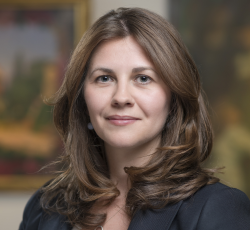
Allison M. Stagg, Ph.D.
Invisible Networks: Women and Printmaking in North America, 1790-1820
Allison M. Stagg is an assistant professor of art history at the Technische Universität in Darmstadt, Germany. Her research on transatlantic visual culture has been supported by the Metropolitan Museum of Art, the Smithsonian American Art Museum, the Wilhelm Busch Museum of Caricature (Germany) and the Gerda Henkel Stiftung. Her first book, Prints of a New Kind: Political Caricature in the United States, 1789-1828 (Pennsylvania State University Press, 2023) received the 2024 Ewell L. Newman Book Award from the American Historical Print Collectors Society. Her second book project focuses on female engravers and collectors of caricature prints in Europe and the United States in the early 19th century. At Mount Vernon, she will work with the considerable collection of engravings, drawings, and ephemera made by women and young girls, with a focus on George Washington memorial engravings.
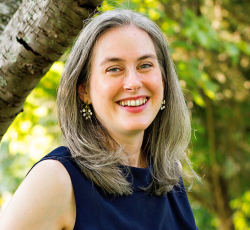
Jennifer Van Horn, Ph.D.
Base Metal: Iron, Enslavement, and Insurgence in the Early United States
Jennifer Van Horn holds a joint appointment as professor of Art History and History at the University of Delaware. She is the author of The Power of Objects in Eighteenth-Century British America (2017), which was a finalist for the George Washington Prize, and Portraits of Resistance: Activating Art during Slavery (2022). She co-edited a special double issue of Winterthur Portfolio entitled “Enslavement and Its Legacies” and is now co-editing the collected volume The Disabled Gaze: Multi-Sensory Perspectives of Art, Bodies & Objects. She serves as the president of the Historians of Eighteenth-Century Art and Architecture (HECAA).

Derek A. Webb, Ph.D. and J.D.
The Spirit of Amity: The Constitution’s Cover Letter and the Original Meaning of Civility
Derek A. Webb is an Assistant Professor of Law at the Catholic University of America Columbus School of Law. He teaches and writes in the fields of constitutional law, civil procedure, legal history, Supreme Court practice and history, and American political thought. At Mount Vernon, he will finish a book manuscript under contract with Cambridge University Press on George Washington’s transmittal letter of the Constitution – or what Webb calls the “Constitution’s cover letter” – that Washington signed, affixed, and had distributed with all copies of the Constitution during the yearlong debate over its ratification. In particular, he plans to explore what Washington – and many of his contemporaries on both the Federalist and Anti-Federalist side of the debate – meant when he said that the Constitution was “the result of a spirit of amity, and of that mutual concession and deference which the peculiarity of our political situation rendered indispensable.” At Mount Vernon, he plans to look at how the letter was drafted, how often it was attached to original copies of the Constitution, what else Washington said about the letter and the "spirit of amity," and how often it was cited and quoted by others during the ratification debates and in the early republic.
Recipient of the James C. Rees Entrepreneurship Fellowship
